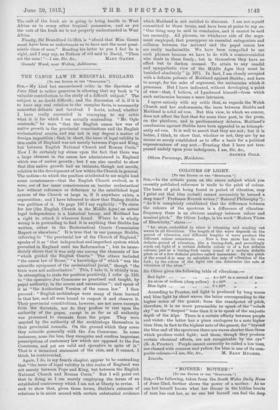THE CANON LAW IN MEDIEVAL ENGLAND.
[TO TUE EDITOR Or TUE " SPECTATOR:]
SIE,-My kind but unconvinced critic in the Spectator of June 22nd is rather generous in allowing that my book is "a valuable contribution to the study of a difficult subject." The subject is no doubt difficult ; and the discussion of it, if it is to have any real relation to the complex facts, is necessarily somewhat delicate and involved. I doubt, indeed, whether I have really succeeded in conveying to my critic what it is for which I am actually contending. "Mr. Ogle contends," be says, "that the English canon law was of native growth in the provincial constitutions and the English ecclesiastical courts, and was not in any degree a matter of foreign imposition ; that, in short, the issue of legal validity in this realm of England was not merely between Pope and King, but between English National Church and Roman Curia." Now I do certainly lay stress upon the fact that there was a large element in the canon law administered in England which was of native growth ; but I am also careful to show that this native growth had an intimate, though not servile, relation to the development of law within the Church in general. The notion—to which the position attributed to me might lend some countenance—that the English Church evolved, as it were, out of her inner consciousness an insular ecclesiastical law without reference or deference to the established legal system of the Church at large is, if it anywhere exists, a superstition; and I have laboured to show that Bishop Stubbs was guiltless of it. On page 103 I say explicitly : "To claim for her [the English Church in the Middle Ages j an actual legal independence is a historical heresy, and Maitland has a right to attack it wherever found. Where he is wholly wrong is in pretending to find it in anything that Stubbs has written, either in the Ecclesiastical Courts Commission Report or elsewhere." It is true that in one passage Stubbs, referring to "the provincial law of the Church of England," speaks of it as "that independent and imperfect system which prevailed in England until the Reformation " ; but be imme- diately shows that it was only one among the elements of law "which guided the English Courts." The others included "the canon law of Rome," "a knowledge of" which "was the scientific equipment of the ecclesiastical jurist," though "the texts were not authoritative." This, I take it, is strictly true. In attempting to state the position positively, I refer (p. 110) to "the operative jus Commune as practised and taught, by papal authority, in the courts and universities "; and speak of it as "the Authorized Version of the canon law." I then proceed : "English archbishops were many of them learned in that law, and all were bound to respect it and observe it. Their provincial constitutions, however, are not mem excerpts from the decretals, nor do they profess to rest upon the authority of the popes, except in so far as all authority was presumed to emanate from the popes. They were enacted by the authority of the archbishops themselves in their provincial councils. On the ground which they cover they coincide generally with the Jus Commune. In some instances, none the less, they recognize and confirm important prescriptions of customary law which are opposed to the Jus Commune, and yet are valid and operative in spite of it." That is a measured statement of the case, and it cannot, I think, be controverted.
Again, I do, in my fourth chapter, appear to be contending that "the issue of legal validity in this realm of England was not merely between Pope and King, but between the English National Church and Roman Curia." But I will point out that in doing so I am merely employing the terms of an established controversy which I am not at liberty to revise. I seek to show that, given those terms, Stubbs's estimate of relations is in strict accord with certain substantial evidence which Maitland is not entitled to discount. I am not myself committed to those terms, and have been at pains to say so. "One thing may be said in conclusion, and it cannot be said too earnestly. All phrases, on whichever side of the argu- ment employed, that presuppose an essential antagonism and collision between the national and the papal canon law are really inadmissible. We have been compelled to use such phrases because we have to do with a controversialist who deals in them freely; but in themselves they have no effect but to darken counsel. To attain to any candid and sympathetic view of the Middle Ages they must be banished absolutely" (p. 107). In fact, I am closely occupied with a definite polemic of Maitland against Stubbs; and have to accept, for the sake of argument, the antinomies which ii presumes. But I have indicated, without developing, a point of view—that, I believe, of Lyndwood himself—from which such antinomies become a mere intrusion.
I agree entirely with my critic that, as regards the Welsh Church and her endowments, the issue between Stubbs and Maitland is wiha ad rein. But this view, in which we concur, does not affect the fact that for some time past, in the press, on the platform, and in parliamentary debates, Maitland's conclusions against Stubbs have been appealed to as triumph- antly ad rem. It is well to assert that they are not; but it is better, I think, to show that, whether or not, they are by no means so surely established as to offer a basis for a political superstructure of any sort.—Trusting that I have not ties. passed unduly upon your indulgence, I am, Sir, &c., Otham Parsonage, Maidstone.
ARTHUR 0






















































 Previous page
Previous page